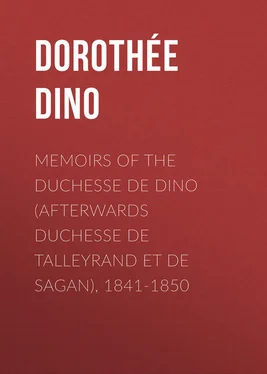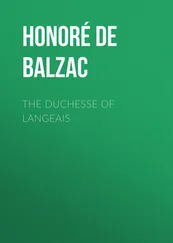Dino Dorothée - Memoirs of the Duchesse De Dino (Afterwards Duchesse de Talleyrand et de Sagan), 1841-1850
Здесь есть возможность читать онлайн «Dino Dorothée - Memoirs of the Duchesse De Dino (Afterwards Duchesse de Talleyrand et de Sagan), 1841-1850» — ознакомительный отрывок электронной книги совершенно бесплатно, а после прочтения отрывка купить полную версию. В некоторых случаях можно слушать аудио, скачать через торрент в формате fb2 и присутствует краткое содержание. Жанр: foreign_antique, foreign_prose, на английском языке. Описание произведения, (предисловие) а так же отзывы посетителей доступны на портале библиотеки ЛибКат.
- Название:Memoirs of the Duchesse De Dino (Afterwards Duchesse de Talleyrand et de Sagan), 1841-1850
- Автор:
- Жанр:
- Год:неизвестен
- ISBN:нет данных
- Рейтинг книги:4 / 5. Голосов: 1
-
Избранное:Добавить в избранное
- Отзывы:
-
Ваша оценка:
- 80
- 1
- 2
- 3
- 4
- 5
Memoirs of the Duchesse De Dino (Afterwards Duchesse de Talleyrand et de Sagan), 1841-1850: краткое содержание, описание и аннотация
Предлагаем к чтению аннотацию, описание, краткое содержание или предисловие (зависит от того, что написал сам автор книги «Memoirs of the Duchesse De Dino (Afterwards Duchesse de Talleyrand et de Sagan), 1841-1850»). Если вы не нашли необходимую информацию о книге — напишите в комментариях, мы постараемся отыскать её.
Memoirs of the Duchesse De Dino (Afterwards Duchesse de Talleyrand et de Sagan), 1841-1850 — читать онлайн ознакомительный отрывок
Ниже представлен текст книги, разбитый по страницам. Система сохранения места последней прочитанной страницы, позволяет с удобством читать онлайн бесплатно книгу «Memoirs of the Duchesse De Dino (Afterwards Duchesse de Talleyrand et de Sagan), 1841-1850», без необходимости каждый раз заново искать на чём Вы остановились. Поставьте закладку, и сможете в любой момент перейти на страницу, на которой закончили чтение.
Интервал:
Закладка:
I then went to an evening reception given by the Countess Neale, where Lord William Russell told me that his Ministry had suffered a heavy defeat in Parliament, but he did not seem to think they would resign. He told me that poor Mitford, whom I recently met unexpectedly as he was leaving the diligence at Fulda to meet his wife at Wiesbaden, found that she had deserted him with Francis Molyneux of all people. She is not very young or very beautiful, and she has several children.
My son, Valençay, writes that the races at Chantilly were most brilliant and fashionable. He stayed at the Château, and is loud in his praises. He says that the Infanta who was caught and brought back, is now staying with Madame Duchâtel, the wife of the Minister of the Interior, as she positively refuses to return to her mother, whom she fears would beat her. She persists in saying that she married the Pole, but refuses to disclose the name of the priest who married them.
Berlin, May 26, 1841. – The old King of the Low Countries, who is here incognito as the Comte de Nassau, is in very bad health, and is said to be attacked by senile gangrene. His wife, 26 26 The Comtesse d'Oultremont.
who is very kindly treated by the Prussian Royal Family, takes great care of the King who cannot do without her for a moment. She never leaves his side. People say that she is really very bored and disgusted by this illustrious marriage which Holland will not recognise in spite of the old King's fury. The refusal to give recognition in Holland is based upon the fact that the marriage banns were not published, nor did any one venture to publish them, as the most violent public demonstrations were feared.
Yesterday morning I accompanied the Wolffs and Herr von Olfers, the Director of the School of Fine Arts, to the studio of Wichmann, to whom I had given an order to copy a charming model that I had seen of a nymph drawing water. It will be finished in a year.
The Prince of Prussia paid me a long and interesting visit. He talked a great deal about the state of the country and the difficulty of government. Difficulties there certainly are, but there is also here a solid basis on which to rest.
Berlin, May 28, 1841. – Yesterday morning was spent with Herr von Wolff discussing business. Our conversation was interrupted by the Court High Marshal, who brought me a very touching present from the King. It is a copy in iron of a statue which I had admired last year at Charlottenhof; a young faun upon a pillar in the midst of a basin pouring water out of an urn upon which he is crouched. The whole work is six feet high and very pretty. The King told me that he would ask me to have it placed upon one of the terraces of Rochecotte, which shall certainly be done.
I dined with Princess Albert. Her father is better, and she is starting with him shortly for Silesia. Her husband wearied me, and she herself is like a colt broken loose. In fact the whole household was not to my taste. Herr and Frau von Redern, who were also dining there, took me to their box to hear Seidelmann in the part of the Jew. 27 27 In Shakspere's Merchant of Venice .
He is now the fashionable actor, but he compares unfavourably with my recollections of Iffland.
Berlin, May 30, 1841. – The Radziwills most kindly arranged a musical matinée at their house in a pretty vaulted room opening on to their splendid garden. Goethe's Faust was performed which had been set to music by the late Prince Radziwill, the father of the present generation. Devrient, the first tragedian from the Berlin theatre, declaimed certain passages to musical accompaniments, and a large body from the Conservatoire gave the choruses. The general effect was excellent and gave me real pleasure. 28 28 Prince Anton Radziwill had been sent to Göttingen to conclude his studies, and while he was then staying in Germany in 1794, he made the acquaintance of Goethe, who was already working at the first part of Faust . Prince Radziwill was profoundly attracted by the beauty of this work, and as he was himself a most enthusiastic musician he undertook to put certain scenes of the great poet's creation to music, and completed the work of composition by degrees. The Prince was on terms of personal intimacy with Goethe, who slightly modified the garden scene between Faust and Margaret at his request. The first performance of Faust with Prince Radziwill's music was given at Berlin in 1819, at the Palace Theatre of Monbijou, before the whole of the Prussian court. The Berlin Academy of Music, to which the Prince presented his work, has performed it almost annually since that date.
Berlin, May 31, 1841. – I propose to leave here to-morrow for Dresden and to proceed thence to Vienna.
Yesterday I went to the High Mass of Pentecost which was very well performed and sung in the Catholic church, but the church was so crowded and the heat so suffocating that I thought I should be ill. However, on leaving Mass I had to appear at the farewell audiences of the Princess of Prussia and of Princess Charles, and then to dine with an old friend. While we were at table I received an invitation to go to tea at Schönhausen, the summer residence of the King, two leagues from Berlin. I was fortunately able to reach Schönhausen in time, and after tea I stayed on to supper which was served in the open air under a verandah lighted by lamps. Apart from the Royal Family and the officials on duty there were the Duke and Duchess of Leuchtenberg, Herr von Arenberg, myself, Rauch, Thorwaldsen and the chief director of the museum, Herr von Olfers. It was an agreeable and interesting party. Thorwaldsen has a fine head resembling that of Cuvier, but he wears his hair in a strange manner, long white locks falling over his shoulders. I prefer the features of Rauch which are better proportioned, and in my opinion nobler and simpler. The Duchess Marie of Leuchtenberg is extremely like her father, the Emperor Nicholas, though with a very different expression: her head is classical in form, but too long for her body which is small; she is as white as a lily, but her finical and fantastic manners did not charm me. The Queen had mentioned me to her, and the King introduced me to the Duke of Leuchtenberg, who is strikingly like his sister, the Duchess of Braganza, though his general appearance is common and does not justify the marriage he has made. At Schönhausen I paid my last farewells.
Dresden, June 2, 1841. – The day before yesterday I left Berlin overwhelmed and spoilt with kindness, but wearied by the dreadful heat. The Baron von Werther whom I saw on my last day at Berlin, told me he feared that M. Bresson had not been entirely happy during the last years of his stay; that his speech had caused much displeasure and inspired great distrust; that he was ill-informed if he thought the contrary; and that all his reliable sources of information had been closed since the death of the old King. The Princess of Prussia and Madame Perponcher spoke to the same effect. I also learnt that when the treaty of July 15 was made known here, M. Bresson committed an inconceivable outburst, drove down the Unter den Linden and shouted war in the wildest manner. I am really sorry that he should re-enter upon a position that he has spoilt.
Dresden, June 3, 1841. – Yesterday evening I went to the theatre to see the new auditorium which has a great reputation throughout Germany. It is, in fact, of considerable size, pretty and well decorated. The boxes are convenient, the seats comfortable and there is an air of grandeur about the whole. The decorations are fresh, the costumes brilliant and the orchestra good, but the singers so bad that I could only stay for half an hour.
Prague, June 5, 1841. – Prague is not without interest for me. I there spent the year of mourning for my father with my mother and sisters and afterwards revisited the town upon two occasions shortly after the Congress of Vienna. I have been spending to-day there and think I have driven round to every object of interest: the chief churches, the tomb of Tycho Brahé and his observatory; all the offerings in honour of St. John Nepomucenos, his relics, the old castle, the Calvary from whence Prague is to be seen as a panorama; Wallenstein's war horse, which has been stuffed, and the various traces of the Hussite war and of the Thirty Years War; the bombs thrown by Frederick II.; the chapel where Charles X. prayed twice a day and which was restored by him, bears the arms of France and of Navarre. Prague, like Nuremburg, is one of the oldest towns in Germany: the latter may be more interesting to artists, but the former is more attractive to the archaeologist, and I am one of the latter class. Prague contains sixteen convents, every class of monk is to be found there, and though upon a much larger scale it reminds me of Friburg in Switzerland. Especially characteristic are the large residences, almost all kept by the great Bohemian lords who own them and who are generally deserting Prague in favour of Vienna. I was curious enough to look in at the theatre of the Leopold Stadt to see a local farce played by a Vienna company. The auditorium which was by no means beautiful, was crowded and the laughter was loud and long; I stayed only a short time as it was too hot and the Vienna lazzi are not to my taste. I do not understand them.
Читать дальшеИнтервал:
Закладка:
Похожие книги на «Memoirs of the Duchesse De Dino (Afterwards Duchesse de Talleyrand et de Sagan), 1841-1850»
Представляем Вашему вниманию похожие книги на «Memoirs of the Duchesse De Dino (Afterwards Duchesse de Talleyrand et de Sagan), 1841-1850» списком для выбора. Мы отобрали схожую по названию и смыслу литературу в надежде предоставить читателям больше вариантов отыскать новые, интересные, ещё непрочитанные произведения.
Обсуждение, отзывы о книге «Memoirs of the Duchesse De Dino (Afterwards Duchesse de Talleyrand et de Sagan), 1841-1850» и просто собственные мнения читателей. Оставьте ваши комментарии, напишите, что Вы думаете о произведении, его смысле или главных героях. Укажите что конкретно понравилось, а что нет, и почему Вы так считаете.












